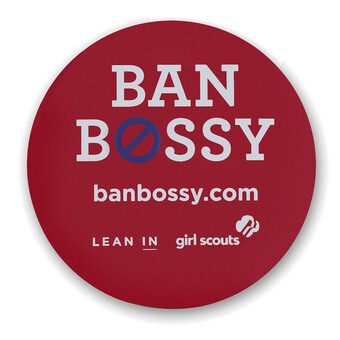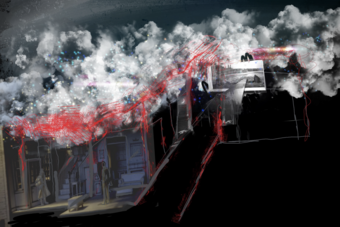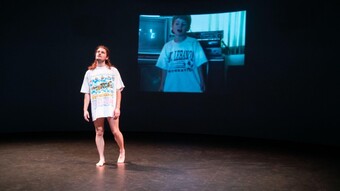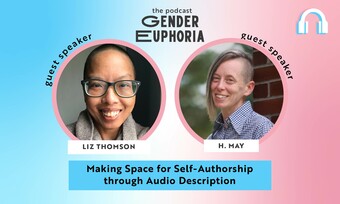The Perils of Directing as a Woman
In their pieces, "Women Directors: Language Worth Repeating" and "The Revolution Will Be Systemic: A Response to 'Women Directors," Jess K. Smith and Hannah Hessel Ratner have started an important conversation about the language that directors use in rehearsal and the extent to which it is gendered. As Ratner pointed out, this is a conversation that's happening in many fields, and it has been happening ever since women started making it into upper-management positions.
In fact Sheryl Sandberg, author of Lean In, has just launched a campaign to "Ban Bossy," so that girls who used to be called bossy start to be told instead that they are leaders. Efforts like this to change the culture, though, are long-game solutions to an immediate problem. In the meantime, how do women directors, especially those just starting out, balance the competing demands of actually leading with gendered expectations as to what constitutes good leadership?
The tendency that Smith observed in her students to end their directions with a question is so engrained in young women today that they often pitch their voices up at the end of sentences whether they are asking a question or not. This "uptalk" reads, to people older than Gen Y, as submissiveness. But, as I wrote in my article on the trend, to other people the same sex and age of the speaker, uptalk simply denotes membership in that particular demographic group. In fact, if Smith's student was directing other people her age, they probably did not find her at all lacking in authority. More likely, they saw her as one of them and therefore trustworthy.
Young women—surrounded in every other part of their lives by women who talk just like they do—are increasingly responding to mentors, teachers, and bosses who try to help them overcome these vocal habits by, as Ratner did, arguing that they shouldn't have to change for society. Society should change for them. People should learn that asking questions and using uptalk is a sign of caring what the other person thinks, not of submissiveness.
As with Sandberg's plan to ban bossy, this revolution will be great. But unless young men adopt this pattern of speaking, too, it is unlikely to become normative for the whole society any time soon. For now, young women are still forced to chose between assimilating, as Smith put it, by adopting a more authoritarian attitude, or trying to get resisters in the cast, design team, and crew to accept that their director's way of speaking does not make her weak.
The choice becomes even trickier when you recognize that we are conditioned to read the same behaviors differently depending on the sex of the person performing them. What is seen as submissive in women is often seen as collaborative in men. Likewise, what is seen as clear vision in a man can be interpreted as inflexibility in a woman. This means that Smith's suggestion that directors articulate "big huge messy ideas that aren’t yet perfected" is far more of a risk for a woman than for a man. A male director who does that is likely to be seen as brave and collaborative. A woman is more likely to be seen as lacking vision.
This is what feminists call a double bind. If you use more authoritative, masculine language, you risk being seen as a bitch. If you use questions and uptalk, you risk being seen as submissive. You're damned if you do and damned if you don't.
If you use more authoritative, masculine language, you risk being seen as a bitch. If you use questions and uptalk, you risk being seen as submissive.
As a result, most women directors, especially at the beginning of their careers when most of the people in the room are older than they are, spend about half of their time and energy dealing with micro-aggressions from collaborators who are uncomfortable with their leadership style. This means these women are spending half as much time and energy as young men actually making art. It's no wonder, then, that more young men than women make it out of "early career" status, with its fellowships and mentorships, to actual full-time employment.
When I've found myself in collaborations with people who reject my direction, I've been advised to ignore the people who don't respect me and just refuse to work with them again, or, alternately, to confront them. Sometimes those things work, but often they don't. The disrespect is hardly ever out right—that's why they are called micro-aggressions—and when confronted, most people simply accuse you of misinterpreting. On the other hand, when ignored, some people dig their heels in further and become even more disruptive. Just one person bent on undermining the director can have a deleterious effect on a production and the general esprit de corps, so while it's all well and good to never work with that person again, the director still must do whatever she can to limit the troublemaker's impact on the current project.
After doing this for 20 years, I wish I had more concrete advice to offer women starting out about how to bridge the gap between their voices and society's expectations. I myself have been told to be both more familiar and more distant, more open to criticism and less easily imposed upon, more authoritative and less demanding, more specific about what I expect and less of a micro-manager. That's the nature of a double bind—there is no right choice.
I can only tell you the one thing that doesn't work: Blaming yourself. The fact that many people are still predisposed to distrust women in positions of authority has nothing to do with your voice or with your vision. Though you are put in a position of negotiating the competing demands of leadership and gender, you did nothing to warrant being put there. This is the silver lining of the double bind: You're damned if you do and damned if you don't, so you might as well do without ever second-guessing yourself.
Over time, your dedication to your voice and vision and your increasing numbers will precipitate change. Women and "feminine" ways of leading will become increasingly acceptable. In the meantime, spend as little time as you can choosing between a rock and a hard place. Whichever someone hits you in the head with, it still hurts.














Comments
The article is just the start of the conversation—we want to know what you think about this subject, too! HowlRound is a space for knowledge-sharing, and we welcome spirited, thoughtful, and on-topic dialogue. Find our full comments policy here
Nice, piece, Holly. I think Sarah O'Connell is onto something in talking about eye contact. People--young women, old women, middle-aged men, whoever--who inhabit their voices and bodies fully accrue respect and authority. Uptalk is largely irrelevant to this--a rising inflection will be inconsequential if the direction is spoken with full and fully-owned vocal support. The fact that it is often harder for young women to find and own 'the Right to Speak' is more a consequence of entrenched attitudes and conditioning in our society than it is a result of a particular inflectional group feature, no matter how picked on or disdained that feature may be by old men.
This effects email etiquette as well. A simple directive or informational email from a woman can be received as disrespectful, angry or tyrannical. It's an interesting gendered digital experience. I've found that when I add the email equivalent of "uptalk" EMOTICONS :) or saying "I suggest" the response is always more favorable. It's time consuming, exhausting, and often counter productive.
20 years of directing in the "double bind" has taught me to look people straight in the eye when I've got something to say. No matter what the tone of my voice, the confidence and mutual respect that makes eye contact possible sets a tone that is helpful. It was hard to do at first. In the beginning I exhibited a lot of apologetic posturing because I was the youngest, and only woman in the room. But eventually I figured out that I was also the director, and I wasn't sorry I got the job, so I stopped apologizing for it.
As a young director I prefer to end many of my instructions in a question because I like to encourage a sense of collaboration in the room. I haven't particularly found that it undermined my authority in the room, so much as that it gives my actors permission to voice their own opinions. That said, I tend to work with young (ish) actors and I try to work on more female-heavy shows. I think you may be right in pointing out that this style of speech may have a different connotation for different groups or ages or genders. So my question becomes, do I change my style of direction in those other situations, or should I try to encourage actors who don't work that way to see the 'questioning approach' as an equally valid style of direction?
This is kind of the approach I take as well - I'm late 30s, transitioning between actor/director, and so I often end with questions so that the actor feels encouraged and respected (since that's what I would want!).
Great article!
Re: Sheryl Sandberg's #BanBossy campaign, bell hooks has started a twitter campaign #BossyandProud (yes, she's on twitter @bellhooks !) so that women can reclaim the term for themselves
rather than try and convince other people not to use it. I think it's a great solution.